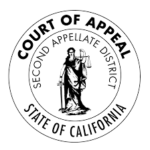LAWSUIT Update: CA Appellate Court is Skeptical of Claremont McKenna Procedures & is Sympathetic to Accused Male’s Claim
As we await a ruling in the first of (at least) three campus due process appeals to go before California appellate courts, a second case involving a guilty finding from Claremont McKenna College was argued before the Second District Court of Appeal. Two of the justices appeared sympathetic to the accused student’s claim that the process used by CMC was fundamentally unfair. Under CMC procedures, both parties spoke to an investigator, who in turn produced a report for the hearing panel—of which the investigator was one of three members. A hearing then occurred, the accused student testified as to his innocence, and the accuser did not appear. The panel found him guilty, and a superior court did not disturb the judgment. The argument before the appeals court focused on three procedural issues—one related to notice, the other two to the adequacy of CMC’s procedures. The notice issue was a nuanced one: the accused student conceded that he eventually was told of the central charge against him. Initially, however, CMC’s investigator only told him that he was alleged to have violated the school’s sexual misconduct policy, but not in any specific manner. In his first interview, he maintained that he had consent for intercourse (which—he didn’t realize—was not the issue the accuser was raising) and did not recall the specific words the accuser had used to indicate consent at the tail end of the incident—because, again, he hadn’t understood this was the focus of the case. The CMC panel would use his initial failure to be clear on the wording of his accuser’s consent at the tail end of his encounter as a reason to doubt his credibility. His argument, therefore, was that if he had received notice of the actual allegations in his first interview, he would have responded to them clearly, and the CMC panel would have had no reason to have doubted his credibility… This lack of notice was particularly important because it was the only one of the five points raised by the CMC panel that clearly called into question the accused student’s credibility… Unfortunately the justices did not show much interest in this aspect of the argument; however, two of the justices,were much more engaged on the second procedural point: that in a he-said/she-said case, it was unfair for the CMC panel to have deemed the accuser the more credible of the parties even though she never testified before the panel. It seems more likely than not that the accused student will prevail, with an opinion focusing on the fundamentally unfair impact of the accuser’s absence from the hearing. But even Justice Bendix, who seemed the most sympathetic of the panelists to the accused students, commented on the need for colleges to balance the rights of the accused with a system that will encourage accusers to report offenses. So there will remain some uncertainty until the opinion is rendered.
academicwonderland.com By KC Johnson

